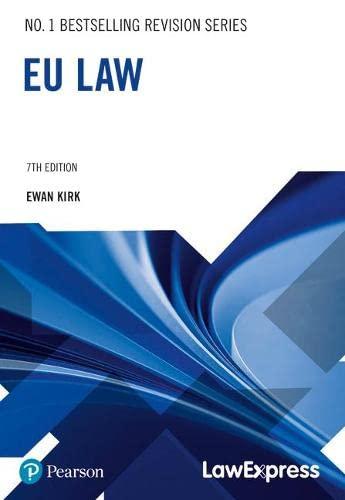Question
1. The Supreme Court's jurisdiction is mandatory, not discretionary. This means the justices do not have a choice in choosing the cases they want to
1. The Supreme Court's jurisdiction is mandatory, not discretionary. This means the justices do not have a choice in choosing the cases they want to hear (True/False)
2. The rule of four is a Supreme Court rule that only four justices need to agree for a case to be heard (True/False)
3. The U.S. Court of Appeals for the District of Columbia Circuit is a specialized court that hears cases against the federal government and the many federal agencies in Washington, DC (True/False)
4. The power of judicial review makes the U.S. Supreme Court the most powerful judicial body in the world (True/False)
5. The "federal judiciary" comprises nearly three percent of the federal budget (True/False)
6. Which of the following is most likely to be subject to federal court jurisdiction?
A. Cases involving adoption from surrogate mothers
B. Cases involving tort claims
C. Cases involving domestic issues such as divorce and family law governing gay marriages
D. Cases involving the interpretation of treaties to which the United States is a party
E. Cases involving the implementation of child custody laws
7. The New Deal...
A. Altered the makeup of the Supreme Court by increasing the number of judges and appointing new justices in the Supreme Court.
B. Was President Richard Nixon's action plan to alter the relationship between the people and their government.
C. Was a legislative package that rewrote the role of government, vastly increasing its size and its role in private commercial activity.
D. Faced much opposition from the White House and the Congress.
E. Was never implemented due to the public's reaction.
8. Which of the following statements is true regarding the composition of the Supreme Court between 1994 and 2005
A. Justice Sandra Day O'Connor was named the first female Chief Justice.
B. Merrick Garland's nomination was delayed for approximately eleven years.
C. Harriet Miers was the first non-judge to serve on the U.S. Supreme Court.
D. The Supreme Court experienced no changes in its composition.
E. Chief Justice William Rehnquist was the first sitting member of the Supreme Court to die while serving.
9. What is true of "stare decisis"?
A. It is the principle which states that all courts are bound to follow precedent established by the U.S. Supreme Court.
B. It dictates that cases such as a state court interpreting its own state's Constitution come under the jurisdiction of the U.S. Supreme Court.
C. It states that the Supreme Court has discretionary jurisdiction to hear any case it wishes to hear.
D. It is a law related to the transfer of property, vehicle or watercraft ownership registration, and the disposition of property after death.
E. It is a term used to describe a legislature in which two bodies exist.
10. Identify a true statement about the United States Sentencing Commission (USSC).
A. Established by the president.
B. Established by Congress.
C. An agency exclusively dedicated to conducting research on judicial administration.
D. An elected branch of government.
E. Runs the day-to-day issues for all the courts.
11. Which of the following is NOT true about the role of Congress concerning the judiciary?
A. The most obvious role of Congress is in confirming judicial selections.
B. Congress controls the judiciary through its annual budgetary process.
C. Congress is obligated to grant raises in judicial salaries.
D. Congress can control the judiciary by determining how the courts are organized.
E. Congress can control the judiciary by determining what kind of cases the courts can hear.
12. The chief justice...
A. is elected by the people
B. serves a maximum term of twenty-five years.
C. has superior power over the other associate justices when deciding cases.
D. earns approximately $260,700 per year
E. is appointed by Congress.
13. In all fifty states, a trial court of _____ jurisdiction accepts most types of civil and criminal cases.
A. General
B. Limited
C. Diversity
D. Federal question
E. Special
14. Identify a true statement about judicial review.
A. The president can hold any act of the federal judges to be unconstitutional.
B. First used in Roe v. Wade case to strike down legislation.
C. A power used by Congress as a means of checking the judiciary.
D. A power that rests with each of the more than eight hundred federal judges.
E. The absolute power of the president to name federal judges.
Step by Step Solution
There are 3 Steps involved in it
Step: 1

Get Instant Access to Expert-Tailored Solutions
See step-by-step solutions with expert insights and AI powered tools for academic success
Step: 2

Step: 3

Ace Your Homework with AI
Get the answers you need in no time with our AI-driven, step-by-step assistance
Get Started


